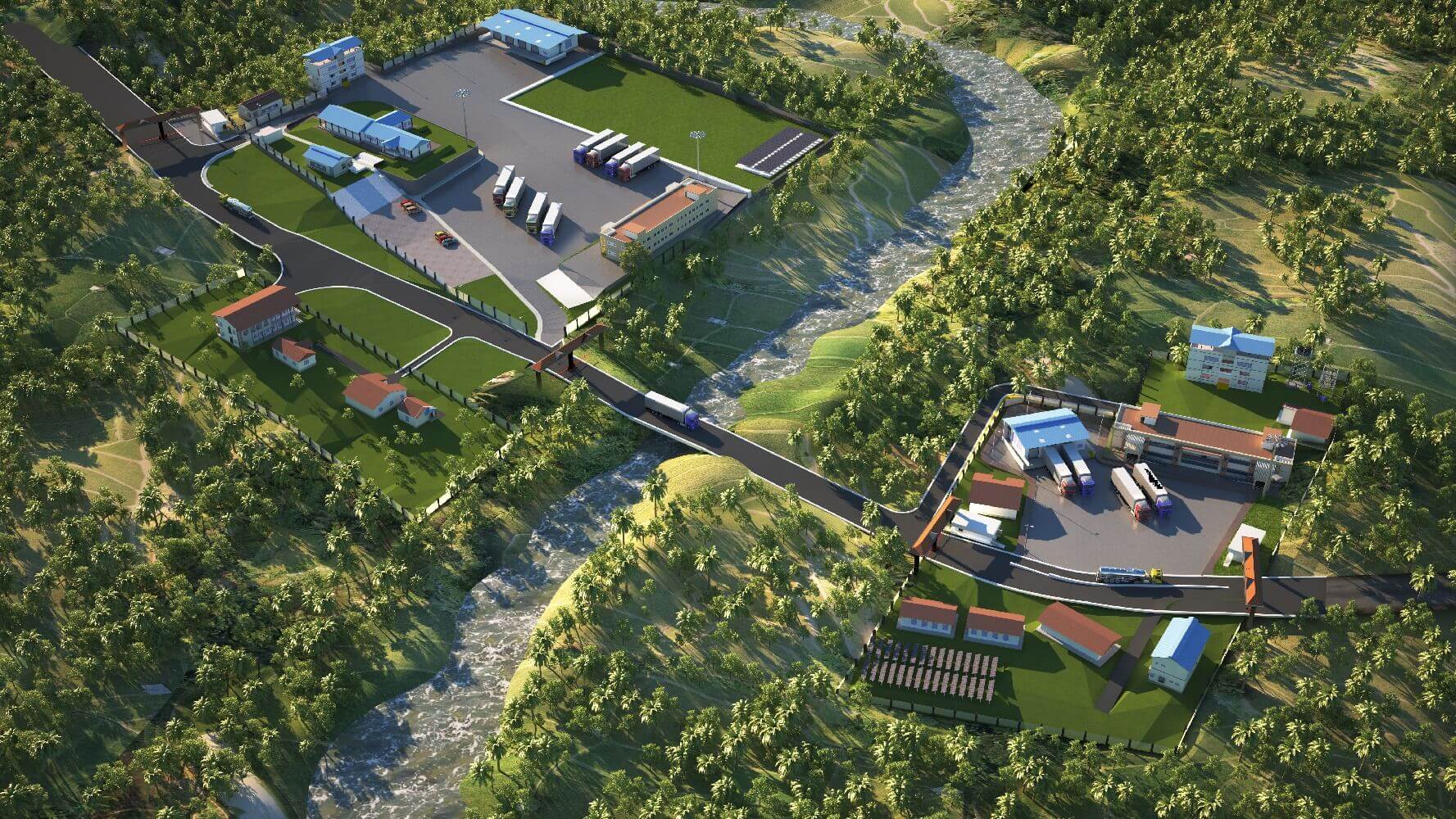The Government of the Democratic Republic of Congo and TradeMark Africa (TMA) signed a contract to begin construction of the One-Stop Border Post (OSBP) at Mahagi in Ituri Province, on the border with Uganda on April 16, 2020. The estimated nine-month project is co-financed by the Netherlands, through its Ministry of Foreign Affairs, and the British Department for International Development (DFID). The works will be carried out by COIL limited. The kick-off meeting was held online on April 30, 2020 due to the precautionary measures related to COVID-19. A ground-breaking ceremony will be held as soon as the situation allows. COIL limited has begun mobilising the necessary staff and resources to start construction work soon.
Mahagi (DRC)/Goli (Uganda) is one of DR Congo’s busiest border crossings, located at the axis linking the popular centres of Arua (Uganda), Bunia (DRC), Kisangani (DRC) and the port of Mombasa (Kenya) along the Northern Corridor.
OSBPs reduce transit time and costs for cross-border movements by integrating Customs processes of border agencies of two neighbouring countries in one place without increasing risks to public security or revenues collection. Transiting users stop once in the destination country for customs clearance, entry and exit processes.
In 2019, TMA supported the construction and initiation of One-Stop Border Posts across 7 border crossing points in the East African Community (EAC) Partner States and the Tunduma border post between Tanzania and Zambia. A survey of time and traffic to cross these borders showed that they have contributed to reducing crossing times by an average of 70%, in addition to facilitating the movement of people and goods. The results exceeded projected targets.
The Governor of Ituri, H.E. Jean BAMANISA SAIDI hailed the project , “This is an initial project to modernise border posts that will allow more formalised systems for imports and exports and will reduce constraints and harassments, with presence of only the four authorised border services mandated to operate at the border. Following these administrative infrastructures, other infrastructure will be developed in the logistics sector, with financial support from the Government or donors, including large impEx containers depots, vehicle parking lots, fuel depots, and facilities such as petrol stations, hotels, etc.”.
The Interim Director General of Customs and Excise, Mr. Jean Baptiste Nkongolo Kabila Mutshi explained the importance of the project, “The construction of Mahagi’sOSBP contributes to modernising border infrastructure in eastern Democratic Republic of Congo. This contemporary infrastructure is expected to play an important role in facilitating trade along the Northern Corridor and enabling the DRC Customs (DGDA) to improve the handling of goods, to reduce processing and declaration time, and to effectively fight against fraud and smuggling, therefore increasing the Treasury’s revenues”.
The Director General of Migration (DGM), Roland Kashwantale Chihoza stated that, “The construction of Mahagi’s one-stop border post is an important step towards modernising border infrastructure and integrating management by services authorised to work at border posts. This step simplifies the control of documents and procedures to enable speedier border formalities. It facilitates quicker migration formalities, and also trade by improving the efficiency of controls and improving the fight against fraud, smuggling, terrorism and other crimes. With standardised border infrastructure, the authorised services will have the capacity to deploy more effectively controls and ensure smooth movements through the borders”.
Figure 2: 3D Image of Architectural Drawings for the Mahagi (DRC) One Stop Border Post
The significance of OSBPs has been highlighted recently since the COVID-19 pandemic, which led several countries to close their borders and restrict travels. Initial reports indicate that OSPBs (such as Malaba and Busia between Kenya and Uganda) have more easily implemented health and hygiene measures while still facilitating movement of goods and reducing long delays. Platforms for collaboration between border agencies created through their respective OSPBs are turning to be very useful tools for issuing consistent messages and adaptive solutions to problems. In Mahagi, the project will integrate hygiene, security, information and sanitation measures to ensure the border is responsive to current and future epidemics outbreaks.
The expansion of the TMA programme to DRC, particularly the east, was at the invitation of the Government. Priority projects include the construction OSPBs, of Mahagi and Ruzizi II; the latter is in Bukavu, DRC and is adjacent to Rusizi II on the Rwanda side.
-Done in Bukavu on June 01, 2020
About TradeMark Africa (TMA)
TradeMark Africa (Trade and Markets in East Africa) is a trade support organisation established in 2010 with the aim of increasing prosperity in East Africa through trade. TMA is a not-for-profit organisation funded by the development agencies of Belgium, Canada, Denmark, Finland, Ireland, the Netherlands, Norway, the United Kingdom, the United States of America and the European Union. TMA works closely with regional intergovernmental organisations, such as the East African Community, national governments, the private sector and civil society organisations.
TMA, with an annual expenditure of around US$ 100 million, is today a leading aid for trade agency in the world.
In its first phase (2010-2018), TMA produced outstanding results that contributed to substantial gains in trade and regional integration in East Africa in terms of reducing transit times for goods, improving border efficiency and reducing barriers to trade.
We are currently in a second phase (2018-2023) where we will focus on:
- Reducing barriers to trade; and
- Improving the competitiveness of enterprises.
We believe that this will have a wide-ranging impact on job creation, poverty reduction and improving the economic well-being of the region’s citizens.
TMA is headquartered in Nairobi, Kenya, with branches at the East African Community Secretariat in Arusha, Burundi (Bujumbura), Tanzania (Dar es Salaam), Democratic Republic of Congo (Bukavu), Ethiopia (Addis Ababa), South Sudan, Uganda (Kampala) and Rwanda (Kigali).















